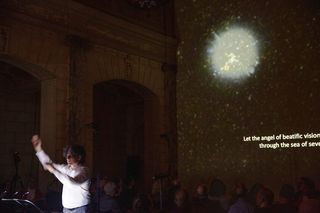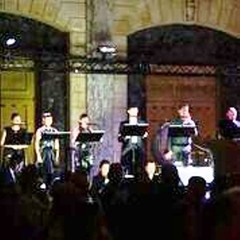|
Back
Bromides from an Old-Fashioned Universe New York
ISSUE Project Room
05/15/2019 - & May 16, 2019
Claude Vivier: Kopernikus : Rituel de la mort
Katharine Dain (Coloratura soprano), Amy Goldin (Soprano), Hai-Ting Chinn (Mezzo-soprano), Kirsten Sollek (Contralto), Christopher Herbert (Baritone), Joseph Beutel (Baritone), Steven Hrycelak (Bass)
International Contemporary Ensemble (ICE): Michelle Farah (Oboe), Joshua Rubin, Madison Freed, Zachary Good (Clarinets), Gareth Flowers (Trumpet), Michael Lormand (Trombone), Josh Modney (Violin); Meridionalis Choir, Sebastián Zubieta (Conductor)
Sergio Policicchio (Live Video)

S. Zubieta and stage
(© Nicolas Manassi/Roey Yohai Photography for Americas Society)
“The musician should no longer perform music but organize sessions of discovery, seances that invoke the forces of nature, forces that existed, exist and will continue to exist, forces that are Truth.”
Claude Vivier (1948-1983), from Introduction to Kopernikus
Guiderius: “The noise is round about us.” Belarius: “Let us from it.”
William Shakespeare (1564-1616), from Coriolanus
To be clear, the music to Claude Vivier’s “ritual opera” Kopernikus was not noise. The seven singers and seven instrumentalists brilliantly did their parts. The voices chanted and repeated tone clusters, trombone and trumpet played chords which could have come from Gabrielli, or the full ensemble gave off remarkable passages which would have been recognized by Karlheinz Stockhausen, one of composer Claude Vivier’s teachers.
The problem was that the music came from behind the audience. We were facing two more factors in a supposedly metaphysical opera. We faced what seemed like a 60-foot high cyclorama looming over the seats, with video visions by Sergio Policicchio which were could have been based on the ceilings of planetariums.
First the infinity of stars traveling across our solar system. Then a variety of suns, bursting open, burning to whiteness, glowing, standing as sentinels as our earth circled around it. Then towering trees, seen from the ground upwards into the heavens. More stars, more trees, all as stunning visually as the music auditorially.
So now we were assaulted–no, that isn’t the right word–rather, we were engulfed, sometimes submerged with a sensory attic of gorgeous effects.
Never to take away from the visual genius of Messrs Policicchio or the musical genius of the late Mr. Vivier, and giving allowance to their creations. But Claude Vivier affirmed that with his ”meditation on different poetic and cultural states...could only write the texts himself. ”
And therein, to quote the Bard again, lies the rub.
Now first, the texts don’t refer to a story. Mr. Vivier “invites us” at the start, with subtitles, since the chorus is an intended blur, to meet Merlin, Mozart, Copernicus, Prince Charming, Richard Wagner and of course Agni, the Indian Vedic God of Fire. (Definitely a male, though towards the end, Agni is labeled “she”). We don’t actually meet them at all, though their names are tossed as if they are old friends.
I suppose that the line, “love is the beginning of death” would refer to Tristan. And the trombone-trumpet growls come near to the sacred sounds from the Rosicrucian-inspired Magic Flute. But no quotes, no attributions are anywhere in the spectacle.
What we have instead are an excess of proclamations on the planetarium visuals. Perhaps 40 years ago (the opera was finished in 1979) they might have had a scintilla of originality. In 2019, the “mysticism” is a series of laughable cliches. They deal with universal love, the obscuring of light and time (though a minute later we’re supposed to look at light and consume time), they proclaim that “death is as quiet as Mother”, that we must listen to “music of lost cathedrals” (Debussy did that music a whole lot better), and that we should (I hate to say it), “snuggle into life’s bosom of love.”
Oh, we also have “philosophical flowers” and monks and “time becoming color”. And maybe I’ve misquoted a few lines, because they came faster and furioser than my pen could write.
Yet within three minutes of the 70-minute “opera-ritual of death”, it was evident that Mr. Vivier’s inspiration came from a senseless jumble of eclectic paraphernalia.
At first, the lines resembled throwaway poetry of the 11th Century poet Rumi (and oh, how Philip Glass set Rumi with appropriate elegance). The notions seemed too awful for Star Wars, but early Spock in Star Trek could have mouthed that we are “the migrants of...galaxies”. I believe that God was also brought up, like sacred burp, several times.
The variations on bromides became so wearying that I began picturing them being mouthed by quack television psychologists with names like Chalkra or Cheesus. Or quack-Sufi mystics seducing willing American teenagers.
That was when I broke same prohibition as the Biblical Lot and Greek Orpheus–and turned around to see those fantastic musicians standing and sitting at the back.

The ensemble
(© Nicolas Manassi/Roey Yohai Photography for Americas Society)
The ICE musicians and the chorus of Meridionalis, conducted by Sebastián Zubieta, had a treasure of music to play. Claude Vivier, born in Montreal, was one of nature’s singularities. He never knew his parents, described his music as plainly sexual, had insatiable wanderlust, moving from Bali to Japan, to Morocco to Thailand to Malaysia, back to Canada, over to Europe, where he studied with Messiaen and Stockhausen and luminaries of the Spectral school.
In 1983, he was writing an opera about a male prostitute stabbing his client to death, and–talk about prescience!–he was stabbed to death by a male prostitute.
And from the music still played in New York at times (his Orion was a spectacular disjointed piece of genius), the world lost a mind of unparalleled abilities.
Were he alive today, I’d suggest keeping Mr. Policicchio’s visuals, retain the 1890’s old-fashioned verbal anodynes–but change the music to to Alexander Scriabin’s 1901 final unfinished symphony, Mysterium. They fit hand in glove.
Alternatively, in 2019, the universe is our backyard, not our mystical playground. Retain all the Vivier music, but change the screen words to quotes from Stephen Hawking and Richard Dawkins, give results of DNA helixes, Black Holes and quantum meta-realities. Just as Karl Marx said that factories were the churches of 1850, the words of scientists are the arcane mystics of 2019.
We pay allegiance not to “a” universe but all the universes beyond all the universes which are the beginnings of all the universes beyond that.
How unfortunate last night that such incredible unsentimental music should be be buried in a litany of moral sentimentalities from an already archaic era.
Harry Rolnick
|